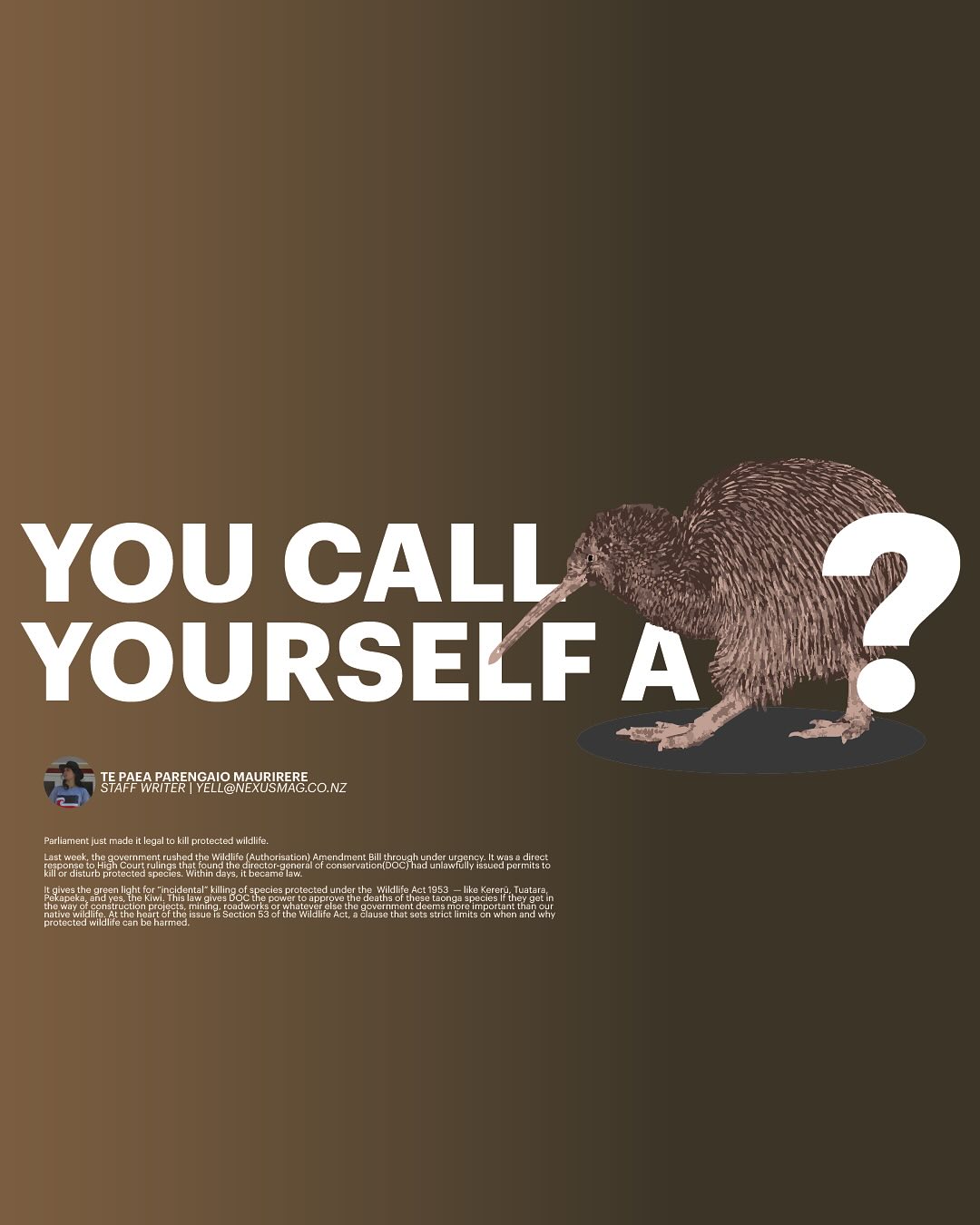
Te Paea Parengaio Maurirere
Parliament just made it legal to kill protected wildlife.
Last week, the government rushed the Wildlife (Authorisation) Amendment Bill through under urgency. It was a direct response to High Court rulings that found the director-general of conservation(DOC) had unlawfully issued permits to kill or disturb protected species. Within days, it became law.
It gives the green light for “incidental” killing of species protected under the Wildlife Act 1953 — like Kererū, Tuatara, Pekapeka, and yes, the Kiwi. This law gives DOC the power to approve the deaths of these taonga species If they get in the way of construction projects, mining, roadworks or whatever else the government deems more important than our native wildlife. At the heart of the issue is Section 53 of the Wildlife Act, a clause that sets strict limits on when and why protected wildlife can be harmed.
What does section 53 actually say?
Section 53 allows DOC to issue permits to take or kill protected wildlife — but only for conservation purposes. That includes things like scientific research, species relocation, or pest control to protect native species.
What it does NOT allow:
Section 53 states that DOC can’t issue permits to kill protected species just because they’re in the way of roads, housing developments, or other construction projects.
This section was at the heart of a High Court case, where the Judge ruled that DOC had overstepped its powers by approving the incidental killing of native bats for a roading project.
National MP Catherine Wedd called it “common sense,” saying there was a technical flaw in the Act. As if the High Court ruling was just a legal inconvenience.
Tama Potaka, Minister of Conservation, defended the move, claiming that section 53 of the act can “delay or stop many important projects.” Minister for Oceans and Fisheries Shane Jones has been clear: he wants the WHOLE Act gone.
Their answer to the Courts? Lets just side-step the judiciary. Strip away the checks and balances that protect our democracy. It’s not just bad lawmaking — it’s a constitutional power grab. What’s the point of a court system if politicians refuse to abide by its rulings? This government didn’t just ignore the judiciary, they rewrote the rules to suit themselves.
Has it ever occurred to you – the developers, the politicians, the decision-makers – that maybe your projects are the problem?
And let’s be clear, These aren’t just animals. They’re not “collateral damage.” These are Taonga species – Descendants of Tāne and Sacred beings of this whenua. Not pests. Not obstacles. If you kill them, then you’re not just harming nature, you’re severing ties to whakapapa, to atua, to a part of who we are.
The biodiversity of Aotearoa is rare and globally significant. When we destroy what makes this whenua unique, we don’t just lose species, we unravel entire ecosystems. Once they’re gone, they’re gone. There’s no getting it all back.
I’m not saying development is evil. Aotearoa needs housing and infrastructure. But there are ways to build with respect for what’s already standing.
The 2018 Kiwi Recovery Plan aimed to grow the kiwi population to 100,000 by 2030. It focused on habitat protection, predator control, and stronger safeguards for native species. This government isn’t balancing progress and protection — it’s sacrificing one for the other.
We can support progress without bulldozing what makes this place unique. It’s not about halting development — it’s about demanding that it be done with integrity, with care, and with respect for whats already here.
The message is loud and clear: Courts don’t matter, whenua doesn’t matter, people don’t matter. Only the agenda does, no matter who it harms or what it destroys.
The worse part?
Our nation’s mascot is the Kiwi. People call themselves Kiwis. Without them, we will simply be a country clinging to a name it no longer deserves. A legacy traded for speed, profit, and silence.